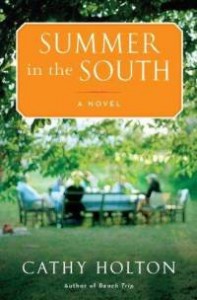I’ll admit it. In a way, I’m late in reviewing this book. It would make a good beach read, and here we are at the end of July. I don’t mean that “beach read” description as an insult. While Summer in the South is an entertaining, reasonably quick read, it has more substance than many of the books that people toss into their suitcases. But it is about a summer, it’s about the South, and it involves a “tragic clan” and a love triangle or two. So it won’t be out of place with the sunscreen and towels.
In my defense, however, because this book does have more substance than a frothy romance, you might enjoy reading it even if you’re not at the beach.
And then there’s the happy reality that we still have all of August, and the beach can be really nice in September or even October. Especially in the South.
By Linda Brinson
SUMMER IN THE SOUTH. By Cathy Holton. Ballantine Books. 340 pages. $25.
 This book could be a cliché, albeit a pleasant one, but it’s not.
This book could be a cliché, albeit a pleasant one, but it’s not.
Cathy Holton teeters on the edge of the clichéd Southern novel because she’s dealing with a lot of elements we’ve read before. There’s the old, rural Tennessee family with, as the flap on the book jacket aptly puts it, “more skeletons (and ghosts) in their closets than anyone could possibly imagine.” We have the dark side of the family and the aristocratic side, with all the usual conflicts and resentments. The legacy of slavery is only one of many unpleasant undercurrents swirling beneath the placid surface of a genteel, privileged, old-fashioned way of life. Violence is there, too. There are always secrets. People know them and sometimes allude to them, but they are much too polite to talk about them. And then there’s the other side of town, where the trashy people live, true to stereotypes.
But Holton rises above the clichés by introducing an outsider as her main character and the person through whose eyes we come to know the Woodburn family of Woodburn, Tenn. This outsider, Ava Dabrowski, is not just a Yankee. She’s an aspiring novelist, with an inquiring mind and a stubborn determination to expose secrets, old and new.
Ava, reeling from the breakup of a disastrous relationship with her boss, surprises herself by accepting the offer of Will Fraser, an old friend from college days, to spend the summer in the home of his elderly aunts in the Tennessee hometown where he still lives. She’s blamed the necessity of earning a living for her inability to complete a novel. Will’s offer could give her the opportunity she’s been looking for.
Ava was raised by a mother who was a holdover from hippie days, moving from town to town, never far enough ahead of the bill collectors. Now her mother is dead, too. Will and his Woodburn relatives have a sense of place, history and family that intrigues her.
Perhaps because she was always bothered by the secrets her mother kept from her, Ava works to unravel the mysteries that haunt the Woodburn family. Various warnings – polite and not so polite – only make her more determined.
Things become more complicated because, even as she tries to understand her feelings for Will, she also becomes interested in his “dark” Woodburn cousin, Jake. One of the family secrets surrounds the estranged cousins and a woman who was once Will’s fiancé.
The best thing about this novel is the way Holton explores the relationship between truth and fiction. As she gradually shows the reader what really happened decades before when the aunts were young, and what Ava spins out of the insights she unearths, she also shows us the difference between reality and a good story. This novel has layers of stories within stories.
The resolution of the love triangle is less satisfactory, not so much because of whom or what Ava chooses as because her reasons are not established convincingly. But that, fortunately, is not the most important part of the book.
One response to “Still time for a summer read”
Two things set this southern novel apart for me as its described. First, the idea of estrangement within families is widespread all over the country — all over the world in fact (and terribly intriguing when mystery is involved). Who doesn’t have some sort of family estrangement, in some sort of fashion?
Second, Ava’s longing for home and roots, typically southern fare, is not based on region and land and class, but on the even deeper level of how one chooses to live one’s life. Will’s genteel upbringing contrasts sharply with the traveling hippiedom of Ava’s parents. I’ve can’t remember another novel that plays these two kinds of families against one another. Sometimes I don’t think I can possibly read one more southern novel, but “Summer in the South” might just lure me in.